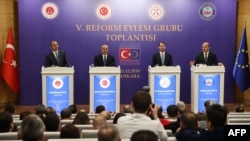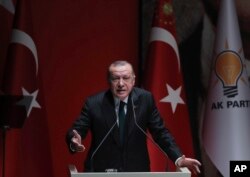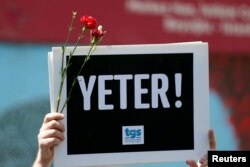Turkish ministers are pledging to speed up judicial reforms as Ankara tries to get its European Union membership effort back on track. They met Tuesday to address Turkey's EU membership aspirations, which have all but collapsed amid growing human rights concerns.
Justice Minister Abdulhamit Gul announced a judicial reform strategy would be unveiled in January at a meeting with Interior Minister Suleyman Soylu, Foreign Minister Mevlut Cavusoglu and Treasury and Finance Minister Berat Albayrak.
The ministers gathered under the auspices of the Reform Action Group (RAG), which was created to expedite EU-required membership reforms, as part of Ankara’s decades-long membership bid. The RAG had been moribund for years. However, the reconvening of the group is interpreted by some as a sign of a new impetus in Turkish-EU relations.
"It is the second meeting of this year, and it is really significant. We are looking forward to the results on the basis of what was indicated in the August meeting," a high-level EU official was quoted by Turkey’s Daily Sabah, as saying.
In August the Turkish ministers pledged reforms on fundamental rights, justice, freedom, and security.
"The aim of the new strategy is to further enhance trust in the judiciary, improve access to the justice system, increase its effectiveness and provide better protection for the right to trial within a reasonable time,” read a Turkish Foreign Ministry statement.
“Ankara wants to improve ties with Brussels. It's realized it was endangered of becoming isolated. I expect more efforts to repair ties,” said former Turkish diplomat Aydin Selcen.
Turkey is continuing to cooperate with Brussels in controlling illegal migration into EU territory as part of a deal agreed to in 2016. “We have reduced by 97 percent refugee migration to Europe,” Interior Minister Soylu claimed Tuesday.
The migration deal remains a point of tension. Ankara accuses Brussels of failing to honor a promise of visa-free travel. However, the EU contends the concession is conditional in part on judicial reforms and addressing human rights concerns.
Ministers at Tuesday’s RAG meeting discussed reforms needed to meet EU demands for visa-free travel. However, analysts suggest Brussels is looking for concrete steps from Ankara.
“In terms of economic benefits, visa waivers, a new customs union (from the EU), I don’t see these things happening so far,” said analyst Atilla Yesilada of Global Source Partners. “Until we release [pro-Kurdish HDP leader Selahattin] Demirtas and journalists from jail, pass a decent judicial reform law, etc., etc., the EU is not going to give us an inch.”
Brussels strongly criticized Ankara for failing to observe the European Court of Human Rights' October ruling calling for the release of Demirtas. Turkish President Recep Tayyip Erdogan dismissed the ruling saying Turkey was not bound by the decision, even though the country is a member of the court.
Dozens of parliamentary HDP deputies along with scores of journalists are among the tens of thousands jailed under anti-terror laws following a 2016 failed coup. Brussels has strongly condemned the crackdown, calling it disproportionate and aimed at silencing dissent rather than protecting democracy, a criticism rejected by Ankara.
On Friday, the Vienna-based media watchdog the International Press Institute slammed Ankara after a three-day visit of its representatives to Turkey.
“We have seen continuing evidence of the systematic targeting of journalists who are doing their jobs,” said executive IPI member Sandy Bremner.
“We have continually heard government assurances that Turkey is committed to free speech, human rights and the rule of law,” he added. “These assurances will only mean something when Turkey is no longer the world's worst jailer of journalists.”
On Monday, Turkish prosecutors demanded sentences of up to 15 years for two leading columnists and three editors of an opposition newspaper on anti-terror charges.
President Erdogan, speaking Monday at a meeting celebrating the 70th anniversary of the U.N. Declaration of Universal Humans Rights, insisted Turkey is not a country where one can find problems regarding democracy and human rights. “No one can lecture our country about democracy, human rights, and freedom,” Erdogan said.
However, analysts suggest it remains neither in Brussels' or Ankara’s interests for a breakdown in ties, and both sides will continue to work on a thaw in the deep freeze that has characterized relations in recent years.
“A Turkish crisis would see another million refugees at their (the EU's) doors, which would be very difficult to stop and destabilize the Balkans,” analyst Yesilada said, “no one wants that. Turkey won't bring the EU down. That's an exaggeration, but if you can avoid such a crisis with small gestures why not do it.”






